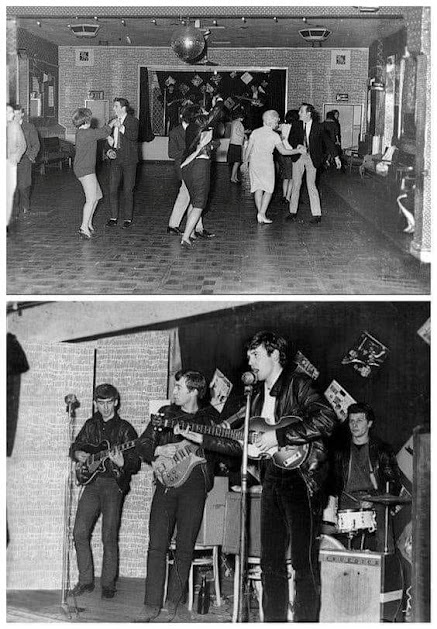As a disclaimer, I should note that the following is not an endorsement of the wide ranging cultural and social changes that the arrival of the Beatles unleashed upon the West. I am more than aware of the baleful influence the cultural revolution they helped perpetuate has had on the world. I merely like their music. Also, as a student of history, I am fascinated by the monstrously disproportionate impact they had on the world at large, the development of Western culture, and the music and entertainment industry as a whole. As an article in the NYT said some years ago, you can't examine the cultural output of America or England in 1962, compare it to the same output two years later, and not conclude what the single change that occurred in between those two radically different offerings happened to be. So no endorsements here, simply which albums I like the most and some notes about the events surrounding this much studied and analyzed group of musicians.
 |
| First performance with drummer Ringo Starr at the Cavern Club, c. Aug, 1962 |
My favorites comprise the the twelve albums (plus EP) they recorded together from 1963 until 1969 (Let it Be was released in 1970, but the sessions had been recorded before they went their separate ways, before the Abbey Road sessions of late 1969). Again, not a bad output in just over 6 1/2 years of recording together. It is purely subjective, as are all of my lists. Which means most likely right. It is from least best to best, with some historical notes for fun. Release dates, with the exception of the Magical Mystery Tour LP, are according to the UK releases.
"In 1956 ,,, there seemed little to suggest that out of this provincial seaport [Liverpool] would come four young men, and a musical revolution, that would captivate and change the world." The Complete Beatles documentary
With the Beatles - Released 11/22/1963
 |
| From L-R: John Lennon, George Harrison, Paul McCartney, Ring Starr |
On October 21, 1963, the Daily Mail coined a term that would define the early years of the Beatles' cultural domination: Beatlemania. Not Frank Sinatra, not Elvis, not Michael Jackson or Madonna or Garth Brooks or Tayler Swift decades later would see such unimaginable crowds, such psychotic levels of hysteria and fanaticism that greeted the band wherever they went. Appearing on the British television show The London Palladium on October 13, 1963, made them a household name in England the very next day. On November 4th that year, they appeared before the Queen herself on The Royal Command Performance, and that launched them into the English stratosphere. Endless books have been written trying to put a finger on what pole-vaulted the Beatles into such near mythical levels of fame and popularity. Was it their style? Their musical composition? Their novel presentation as musicians? Their harmonies? Their long hair? A million theories have been given and, like most things, it was likely a bit of everything and some things we just can't pinpoint. Whatever it was, they seemed to touch a raw nerve among the population at just a certain point in history. One of those 'million chances in one' that so often determine the course of the human story. In any event, soon the tens of thousands of hysterical fans, the streets and neighborhoods and airports shutting down, the fainting girls and deafening screams would become their trademark.
It was this that caught the attention of American television and entertainment moguls. Especially as they were looking for stories that might salve the wounds in America that were left from the assassination of President Kennedy. Contrary to urban legend, Ed Sullivan did not say 'just stomp on them' when he was informed by a London cabbie that the streets were shut down because of the Beatles. He had already signed a deal with Beatles manager Brian Epstein after seeing thousands of fans shut down Heathrow Airport to greet them on their return from Scandinavia. In the midst of this fervor and fever pitched zeal, their second album With the Beatles was released to record breaking advanced sales. Almost immediately, everyone knew that this new group was going to be different. Artistic flare was certainly used for other artists and their albums, but the stark Bohemian appearance, the restrained and somber look, said we're here to be different (the photographers employed by the group always seemed to capture the right look at the right moment, and the band benefited mightily from that fact). It captured perfectly the Beatles as the first true 'self-contained musical group'. Once again, a significant number of songs were written by the songwriting team of John Lennon and Paul McCartney. With its release, the Beatles cemented the greatest domination of the British music scene in history. For over half the year, they monopolized the top spots on both album and singles charts, and seemed with ease to place one song after another at number one. In addition, at a time when 'Rock and Roll' was still seen as a passing teenage fad, Paul McCartney and John Lennon were named by the London Times as the outstanding British composers of 1963. Yet, compared to most of their output, this album has the fewest notable songs. If you consider how many of their songs are among the most famous and celebrated of the Rock Era, this album has none. Even their most recognizable song She Loves You (with the immediately identifiable refrain of 'yeah, yeah, yeah') was released alongside the album as a stand alone single. Hence it's place in the list as 'least best.'
 |
| An all too common scene outside a hotel in the growing phenomenon called 'Beatlemania' |


No comments:
Post a Comment
Let me know your thoughts